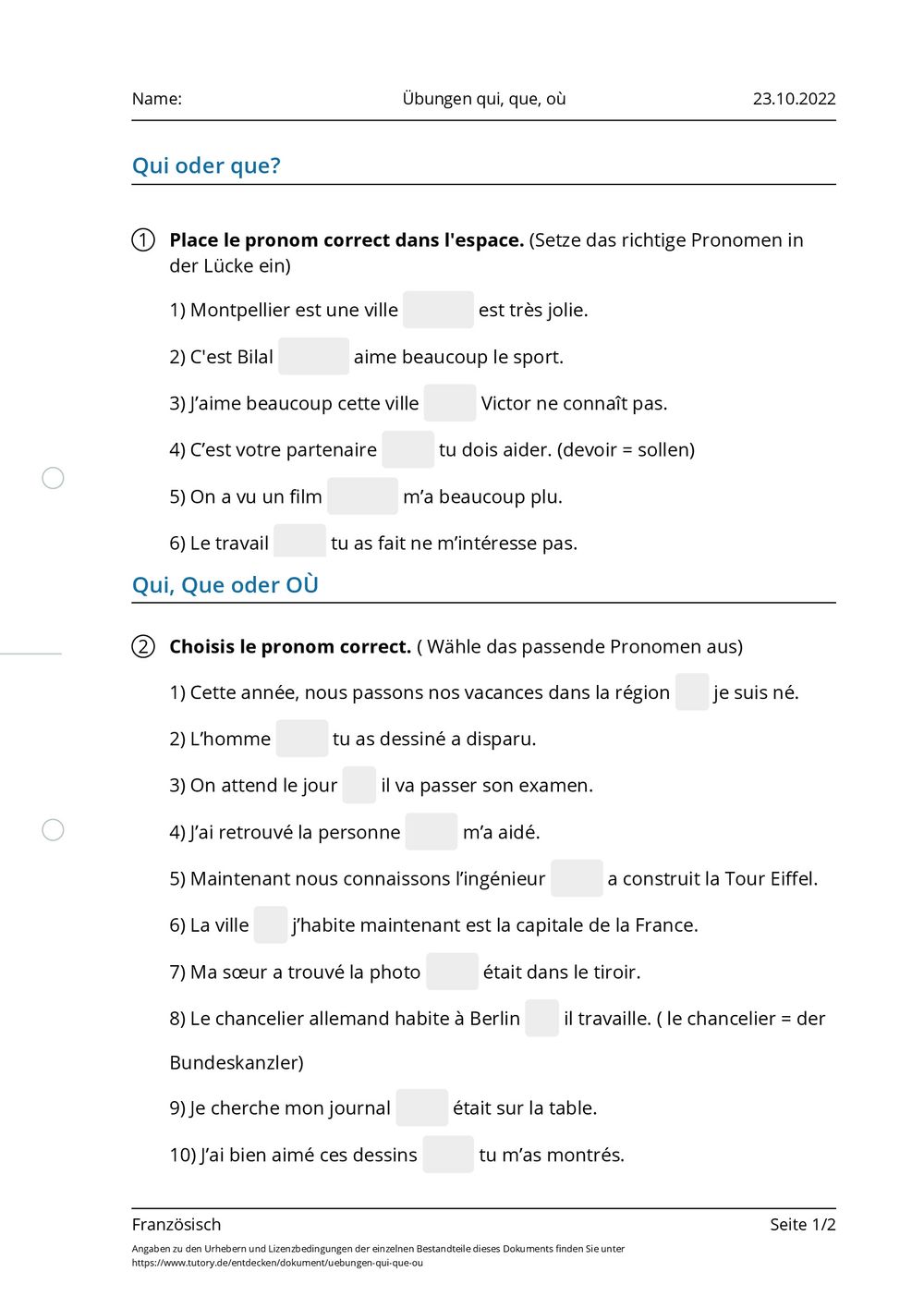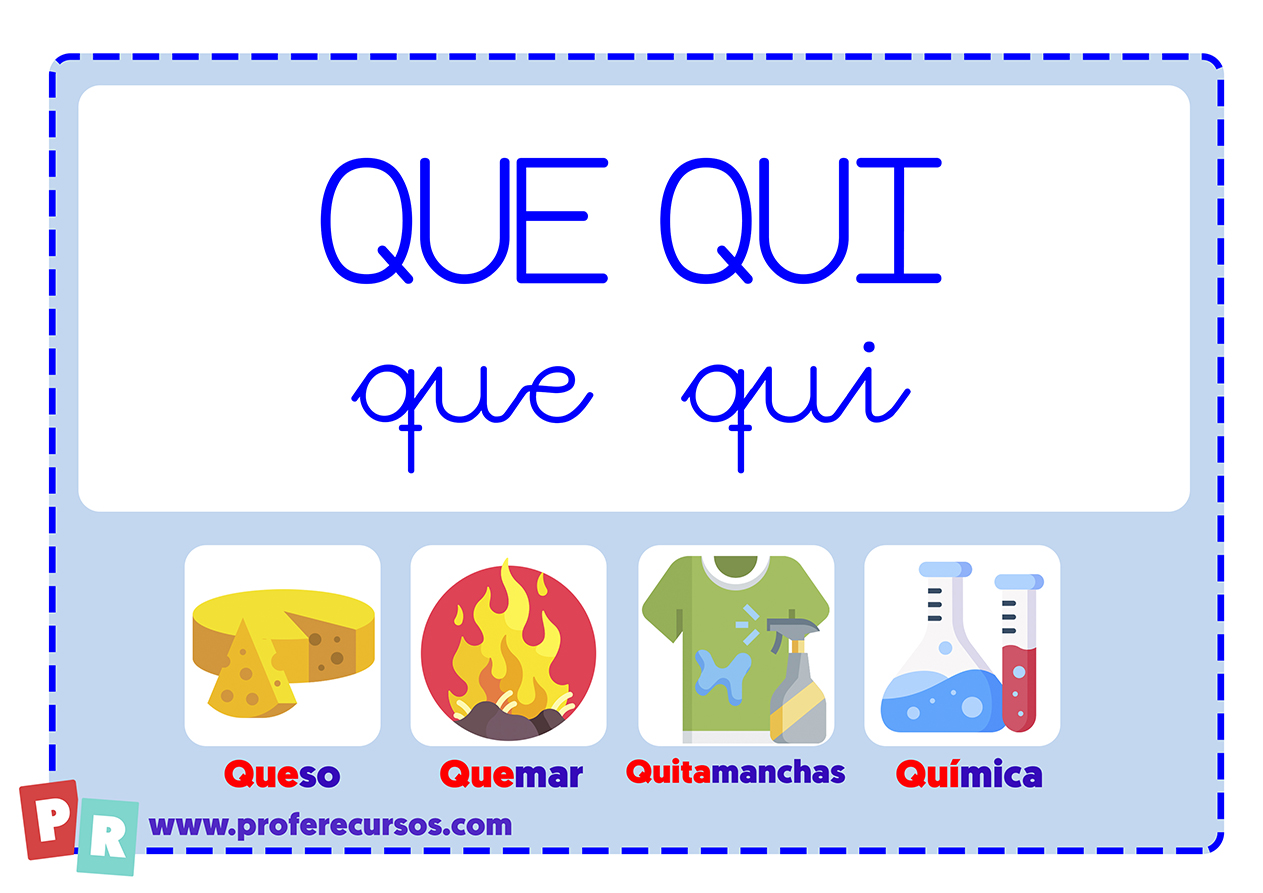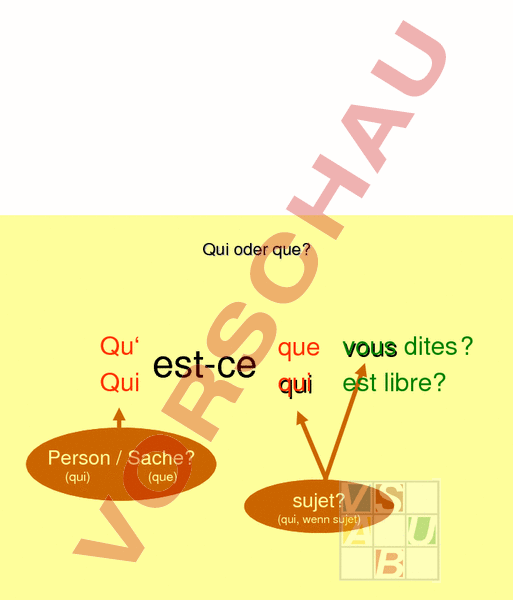
Arbeitsblatt Übungen qui, que, où Französisch tutory.de
Here, "qui" refers to the person being asked. When to use "que": "Que" is used to refer to the direct object of the sentence, meaning the person or thing that the action is being performed on. For example: "Paul mange une pomme" (Paul is eating an apple). Here, "une pomme" (an apple) is the direct object, so "que" can be.

Fragen Mit Qui Und Que Übungen
En résumé : Que vs Qui. As a relative pronoun, que is a direct object (person or thing), and qui is either a subject (person or thing) or the object of a preposition (person only). Some teachers will tell you that the difference is much simpler: " Qui is always followed by a verb, que is followed by any other part of speech."

Relativsätze im Französischen Qui, que, ce qui oder ce que? Ein Überblicksvideo Französisch
Qui is a subject pronoun, it replaces the subject of the sentence. Example: Je prends le train. Le train va à Paris. I'm taking the train. The train is going to Paris. In order to avoid repeating « le train », you can use a relative pronoun. In that sentence, "le train" is the subject. You can therefore create one single sentence out.

Ideen fur Ce Qui Ce Que übungen
In French, you can't simply say "The year that I arrived" instead, you must say "The year when I arrived". Since you seem a bit confused as to the roles of "où", "que" and qui, allow me to offer a bit more information to help make things clear. The french word "que", when it is used to bridge two clauses (sentence fragments), stands in for the.

QUI QUE OÙ DONT/ 4 basic French relative pronouns Learn French with Fun
Qui and Que . Qui and que are the most often confused relative pronouns, probably because one of the first things French students learn is that qui means "who" and que means "that" or "what."In fact, this is not always the case. The choice between qui and que as a relative pronoun has nothing to do with the meaning in English, and everything to do with how the word is used; that is, what part.

Französisch lernen QUI oder QUE? Der Unterschied! YouTube
Qui vs Que + est-ce + qui vs que. As summarized in the above table, there are four possible combinations when asking questions without inversion. Just remember that the first word (the interrogative pronoun) determines whether you're asking who ( qui) or what ( que ), and the last word (which is a relative pronoun) determines whether the.

ce qui und ce que Französische Grammatik erklärt YouTube
At the beginning of a question, usually means "who" and que typically means "what". This is what French learners typically think each word means. However, either word can mean "who" or "that". In fact, don't translate directly to any one English word. That's because qui and que are also what's called relative pronouns.

Que Qui E91
When trying to decided whether to use qui or que remember this simple rule: "qui + verb", "que + personal pronoun or person". La voiture qui est (qui + verb) rapide est dans le garage. The car that's fast is in the garage. La voiture que je (qui + personal pronoun) vais acheter est rouge. The car that I am going to buy is red.

Pin auf Französisch Sekundarstufe Unterrichtsmaterialien
Je lis un livre. Ce livre est intéressant. Le livre QUE je lis est intéressant. = The book (that) I'm reading is interesting. QUE devient QU' devant un mot qui commence par une voyelle ou un H muet. QUE becomes QU' in front of a word beginning with a vowel or a mute H. Le livre qu'il lit est intéressant. = The book he is reading is.

Относительные местоимения qui и que Французский для начинающих на сайте kartinkifr.ru
Qui often means "who" when employed as part of a question. Qui is used in prepositional phrases. How to Use Que in French. Que is used to stand for the object of a subordinate clause. Que means "what" when used in a question. Que can also mean "only.". Using Que in the Passé Composé. Using Qui in the Passé Composé.

Pin auf Französisch Sekundarstufe Unterrichtsmaterialien
How to use ce qui, ce que and ce dont in French. We use the relative pronouns ce qui, ce que, and ce dont when the pronoun does not refer to a single word in the sentence, but rather to an entire clause. Each form is used differently according to its function in the relative clause. Ce qui is used for a grammatical subject. Example: Il ne sait pas ce qui s'est passé.

Hervorheben im Französischen c'est...qui oder c'est...que Französisch Grammatik YouTube
La voiture que j'ai achetée est trop belle. Das Auto, das ich gekauft habe, ist total schön. La voiture qui me plaît est une coccinelle. Das Auto, das mir gefällt, ist ein Käfer. L'homme que j'aime s'appelle Victor. Der Mann, den ich liebe, heißt Victor. L'homme qui est dans mon lit s'appelle Victor.

Pin auf Französisch Sekundarstufe Unterrichtsmaterialien
As you know now, the relative pronoun QUI is for subjects and QUE for objects. In other words, in a sentences with the relative pronoun QUE, you have 2 different subjects. If you identify the 2 subjects, you know for sure you're going to use QUE to link them. However when you connect them, you'll have a subject and an object.

Palabras con Que y Qui
National 5; Relative pronouns - qui, que, dont Qui, que, dont. A relative pronoun is a word used to link two parts of a sentence together when referring to something mentioned at the start.

Qui or QUE ? A Cup of French
Mon frère, qui a vingt ans, est à l'université.My brother, who's twenty, is at university. Est-ce qu'il y a un bus qui va au centre-ville? Is there a bus that goes to the town centre? Les amis que je vois le plus sont Léa et Mehdi. The friends (that) I see most are Léa and Mehdi. Voilà la maison que nous voulons acheter. That's the house (which) we want to buy.

Arbeitsblatt Qui oder que in der Frage Französisch Grammatik
Quiz Yourself on Que vs Qui. At the end of every lesson you can do a small quiz. You will see the sentences of the previous chapter. You will either need to fill in the blanks, choose the correct multiple choice option, or both. Once you are done the correct answer will be shown. You can redo the quiz as many times as you want!